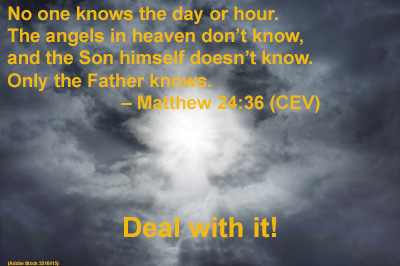Community and Inspiration
I’m continuing a fairly long series of essays on inspiration. Some of this material will be included in my new book, When People Speak for God, though I haven’t scheduled a time yet when I’ll complete that manuscript.
In my previous entry, The Heart of Inspiration, I said that inspiration starts from any experience of God, not necessarily words that are dictated by God, or even specific messages that are presented to a prophet, but rather from very human people experiencing the presence of God and then trying in their own words to record what they experienced. I suggested that this model explained more of the Biblical text than other major models used in discussing inspiration.
There should be at least some readers who are getting annoyed at the continuing lack of a foundation for all of this, or one could say my use of circular arguments. That frustration is likely to continue. If we had some standard by which to judge divine revelations, it would itself have to be revealed, and then we’d just start the same set of questions all over again. What made this new super-standard into a standard?
In thinking about this, I’ve tried to avoid coming up with an explanation of how I think I should have decided what, if anything, is inspired. Rather, I’d like to look at how I did, in fact, make that decision. And that comes in two parts. First, I grew up with the Bible. From the earliest time I remember, the Bible was presented as true and as God’s word. That was just an assumption in our family and in our church community.
When I was about 10 years old, I asked my father how one could know that the Bible was true. I suggested the idea of fulfilled prophecy as an option. Instead, he told me that one couldn’t know or prove that the Bible was true, this was one of the things we take on faith. I have come back to that little piece of thinking many times in my life.
The second phase came after graduate school, when I left Christianity entirely for a period of time and then returned. Again, I was confronted with the question. I could not be convinced that the Bible was inerrant, and in fact, I remain convinced that the human element shows through scripture in the form of very human failures to comprehend and express the message or the experience of God. Now perhaps I could make an informed choice between various available scriptures. But there was still no acceptable standard by which one could judge the available scriptures.
Muslim friends have suggested I should accept the Qur’an, and therefore Islam, because it is so comprehensive, and answers every question. I’m afraid that I don’t actually find that very attractive in a religion. Now understand that I’m not criticizing Muslims for what they want and what they find in their scriptures. I’m not talking about what I should want, but rather about what I do want. I still know of no way in which to discover what I really ought to want in religion or a scripture. What I do want from scripture is something that is challenging and provides an opportunity for discussion, and the Bible certainly provides me with that.
What I see from this is that my choice of scripture derives from community. From an experiential point of view I am a Christian because I was raised in a Christian family as part of a Christian community. I have studied further and I believe have more reasons than that to remain a Christian, but the bottom line is that the starting point was that I was born into the community. Further, I have continued to have spiritual experiences that relate to the Christian community, and which reinforce my sense of the presence of God. These experiences relate well to the experiences of the scriptures, and thus these reinforce my belief in the validity of those scriptures.
Which leads me right back to what my father told me when I was 10 years old: I’m taking it on faith.
